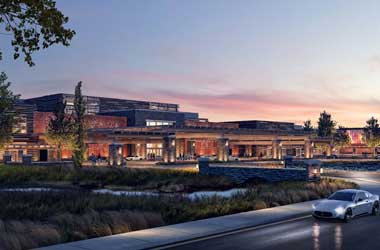 Summary:
Summary:
- A federal judge ruled against Graton Rancheria’s request to delay the Koi Nation’s proposed resort-casino project,
- The decision allowed the approval process to proceed, marking a significant win for the Koi Nation and a setback for opponents.
- Construction near Windsor could begin in 2026 and last two years.
A federal judge has ruled against the Federated Indians of Graton Rancheria’s attempt to delay the decision on a proposed resort-casino by the Koi Nation in California.
U.S. District Judge Rita F. Lin’s ruling is now paving the way for the project to proceed, marking a huge victory for the Koi Nation, a Pomo tribe displaced from Lake County, and a setback for Graton Rancheria and other opposing North Bay tribes.
Graton Rancheria Wants Consultation to Continue
Graton Rancheria’s Chair, Greg Sarris, expressed disappointment with the ruling, urging President Biden and Interior Secretary Haaland to allow further consultations.
We call on President (Joe) Biden and (Interior Department) Secretary (Deb) Haaland to allow consultation to continue in the next administration rather than setting a dangerous precedent
The Koi Nation’s proposal, a casino development on 68 acres of vineyard land near Windsor, has already sparked considerable controversy.
Following the approval of a similar casino project by the Scotts Valley Band of Pomo Indians in Vallejo, many are speculating that the Biden administration aims to expedite the Koi project before the swearing-in of President Donald Trump on January 20.
Accusations of Trust Betrayal
Meanwhile, the Lytton Rancheria, which joins Graton Rancheria in opposition, has expressed its alarm over the situation. Lytton Rancheria Chair Andy Mejia issued a statement accusing the federal government of betraying tribal trust and ignoring the impact on local communities.
These decisions are an affront to the sovereignty of impacted tribes and a betrayal of the federal government’s trust responsibilities
The Koi proposal, which was first presented to the federal government in 2021, has drawn considerable opposition from local community groups, elected officials, and rival Sonoma County tribes.
These groups have been very vocal in expressing their concerns over the environmental, social, and cultural consequences of the project.
“The fight is far from over” Mejia vowed, promising to pursue every legal avenue to prevent the casino from moving forward. While Judge Lin rejected the request for an injunction, she acknowledged some of Graton’s claims, such as the Bureau of Indian Affairs’ failure to consult on certain cultural matters.
However, Lin determined that the potential harm from proceeding with the approval process was not immediate.
The next steps for the Koi project include additional reviews and a Record of Decision by the Bureau of Indian Affairs. If given the green light, construction is expected to begin in 2026 and last up to two years.
The project’s approval would greatly impact local tribes and communities, especially Graton Resort & Casino, the Bay Area’s largest tribal gaming facility, owned by Graton Rancheria.
While the Koi Nation aims to compete with existing casinos, local residents have raised concerns over traffic, crime, noise, and, critically, the potential impact on wildfire evacuations in the fire-prone region.
Elected officials, including Governor Gavin Newsom and U.S. Senators Alex Padilla and Mike Thompson, have also voiced strong opposition to the project.

